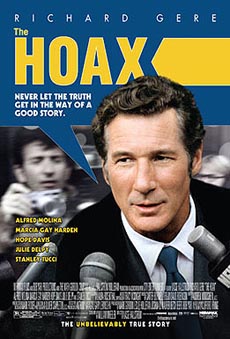It’s such a pleasure to watch Alfred Molina work — his powerful, expressive face can register sensuality (Diego Rivera in Frida), cunning (Cardinal Aringarosa in Da Vinci Code), and delicious evil (Dr. Ock in SpiderMan). So facile an actor is he that he almost (almost) makes The Hoax bearable, especially since his every small gesture wipes the floor with Richard Gere. Gere, the sequentially type-cast American gigolo, still can’t do much with those little, teeny, porcine eyes and waning hormonal swagger.
This is a big fat shame, since The Hoax — based upon the true lies of con-man Clifford Irving — requires that we sit through two hours of continuous Gere. Gere strutting. Gere with a Texas accent. Gere wearing tight, dyed-brown curls. Gere attempting humor. Gere gesturing in the general direction of subtle emotions he knows nothing about. Gere fails, however, to do much more than fill up what looks for all the world like a freshman effort from the UCLA film school. More’s the pity, since the socio-political environment of the early 1970s in which Irving cooked up his scheme to fake an autobiography of none other than clandestine billionaire Howard Hughes, froths with innuendo.
We’re on the very edge of the Watergate scandal, and Hughes has got some goods on Nixon. Enter Irving, a shallow narcissist who’s willing to compromise his sidekick and research go-fer Dick Susskind (Molino), as well as his long-suffering wife (played by a waddling, bewigged Marcia Gay Harden). Irving storms into McGraw-Hill and hands them forged documents (whipped up by himself) allegedly from Howard Hughes, authorizing Irving to write HH’s autobiography. McGraw-Hill falls for the trumped up document, sort of, and the hoax is on. In its day, the media hype around this scam was as big as the crumbling Nixon administration. And the story is still breath-taking – which is why this failed film is all the more irritating.
Gere couldn’t deliver a film with both hands and a Blackhawk helicopter. He groans, grunts, prances, yells the F-word for emphasis, slams a few doors and laughs his head off while driving in convertibles. Yeah, it’s that interesting and complex. What I really need to know is how somebody named Lasse Hallstrom got ahold of the financing to make this film. The attempts at screwball comedy, such as scenes in the McGraw-Hill editorial chambers when Gere and Molino twitch and squirm as they are almost revealed to be liars, just fall flat. The script is pathetic, as if written by extraterrestrials without a working knowledge of either human emotions or something resembling the English language.
Just when you thought Gere’s career was in the toilet, he surfaces here long enough to flush it all the way down the drain. Try to hold on to your memories of An Officer and a Gentleman. They are all that’s left of Gere. Molino, a splendid and versatile actor (who we can only speculate must have had some overdue house payments) will live to act another day. Meanwhile, the real hoax is on us!

